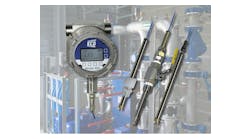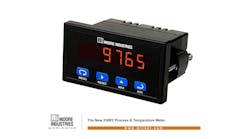Dover breaks ground on Houston Innovation Lab
Dover Precision Components is breaking ground on a new Innovation Lab. The nearly 12,000-square-foot building is being constructed directly north of the company’s Pearland operations in Houston, Texas. Representing the company’s ongoing commitment to research and development, the Innovation Lab will centralize test rigs for hydrodynamic fluid film bearings and reciprocating compressor components previously housed in Pewaukee, Wisconsin, and Knoxville, Tennessee. These test rigs allow Waukesha Bearings and Cook Compression to validate designs and analytical methods and test products under demanding operating conditions. In addition, they equip R&D engineers to develop new application solutions. The Innovation Lab capabilities will include performance testing of journal and thrust bearings with oil or process lubrication over a wide range of loads and speeds; damper design characterization and enhancement; performance and accelerated life-cycle testing of reciprocating compressor components; flow characterization of compressor valves; dynamic testing of packing case leakage; competitive benchmarking; and advanced materials development. The Innovation Lab is scheduled for completion in the second quarter of 2020, with test rig commissioning to follow.
Endress+Hauser and Vector CAG secure MIV contract at Texas refinery
Endress+Hauser secures the Main Instrument Vendor (MIV) contract at a large Texas refinery. Endress+Hauser and its representative, Vector Controls and Automation Group (CAG), will support the refinery’s project. Endress+Hauser defines MIV services as a contract placed with a single instrumentation specialist partner to provide a total solution for a project including valves. From feed to operation, customers can save time, reduce cost and mitigate risk with one partner to ensure consistency and avoid ambiguities. As the industry implements IMO 2020 regulations, expansions such as these help refiners add capacity to meet the needs of the industry. IMO 2020’s proposed regulations aim to reduce sulfur content in fuel of marine vessels and limit future greenhouse gas emissions.
Endress+Hauser and Vector CAG will closely support the project timeline to help the refinery maximize its potential. Project services will include: project management, embedded engineering, Smart Plant Integration (SPI), quotation, reporting, procurement, expediting and prioritization, documentation, warehouse support with receiving, inspection, tagging and shipping, and on-site construction coordination.
TÜV SÜD National Engineering Laboratory launches multiphase facility
TÜV SÜD National Engineering Laboratory launched its £16 million Advanced Multiphase Facility (AMF). Operating at pressures up to 140 bar, the AMF doubles previous test facility capabilities to meet industry measurement challenges. The AMF has high flow rates for both gas and liquid within one multiphase facility. Spanning 1,600 m2, the AMF contains a £1.45 million, full-production scale separator with an operating weight of 270 tons, offers an integrated subsea choke and is capable of testing the complete range of flowmeters. 2D, three-phase, x-ray tomography and sensors deliver high-definition images of complex flows to expand industry’s understanding of fluid behaviors and their effect on measurement. The AMF will focus predominantly on the global subsea sector and wet gas business, facilitating company-led industrial projects and product development, hands-on industry training and academic research. Scottish Enterprise supported the development of the AMF with £4.9 million of research and development funding. TÜV SÜD National Engineering Laboratory’s parent company, TÜV SÜD AG, invested £11.1 million.
New app calculates hydraulic oil viscosity at different pressures
Webtec launched a new online hydraulic oil viscosity calculator app that calculates the viscosity of hydraulic oil at different operating pressures. Hydraulic fluid suppliers provide oils with different viscosities. These oils are most-often badged in terms of their ISO number or grade, where common grades for hydraulic circuits include ISO 32, 46 and 68. Using Webtec’s app, engineers select the oil being used, along with the system temperature (°C) and pressure (bar), hit the submit button and the viscosity (cSt) pops up in the window. To see the effects on viscosity of fluctuations in temperature or pressure, the user alters the values in these fields accordingly. The free Webtec app is the company’s light version. More detailed results, including graphs (some in 3D), can be accessed by logging in (existing users) or registering (new users). The graphs can be saved for use in the user’s own reports.


